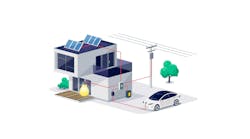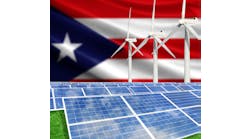When ISO New England (ISO-NE), a grid operator, developed its first forward capacity markets in the early 2000s, US Rep. Sean Casten, D-Ill. — then an energy developer — built a cogeneration plant in northern Vermont that yielded savings for the plant owners and the ISO by cutting peak demand on the system.
During a press interview at the time, he was asked about the technological breakthrough that allowed him to build such an innovative project. He responded that the technology was $1,000 worth of monitoring and control equipment purchased from Radio Shack.
The real breakthrough wasn’t about technology. It was about getting paid for the value the plant created, said Casten, who Elisa Wood, editor-in-chief of Microgrid Knowledge, interviewed as part of Microgrid 2022, a two-day conference that drew more than 550 people to Philadelphia this week.
Not only do cogeneration plant owners need that compensation, but so do microgrid owners, he said during the interview.
“For the first time, ISO New England actually paid us to reduce peak demand on the system,” said Casten. But microgrid and other plant owners are generally not getting compensated enough, which stymies the industry’s ability to provide value to the grid and to society, he said.
“You are creating value…”
“Know that you are creating value when building out those microgrids,” he said. “When you find those places where you say, ‘I would have built more value if I actually got paid for it,’ let us know and we’ll sing from the rooftops and make the regulatory changes to help you make more money by doing more of the right thing.”
Casten is very well suited to help the microgrid industry do more of the right thing. The Illinois congressman serves on the Science, Space and Technology Committee, the Select Committee on the Climate Crisis and is vice chair of the House Financial Services Subcommittee on Investor Protection, Entrepreneurship and Capital Markets. He also serves as co-chair of the New Democrat Coalition Climate Change Task Force.
Before becoming a congressman, Casten co-founded Recycled Energy Development (RED), which focused on recycling wasted energy and converting energy facilities to cleaner, more economic uses. He is also former president and CEO of Turbosteam, which focused on utilizing energy recycling technologies to reduce greenhouse gas emissions by generating heat and power from previously wasted energy.
Family legacy in energy
In fact, his experience in the energy field dates back to his childhood. His father is well-known energy entrepreneur Thomas Casten, who spent 40 years developing decentralized energy recycling projects. Cummins Cogeneration and Trigen Energy were among the companies he founded, along with RED with his son.
Energy policy topics often cropped up during dinner conversations — even when the conversation began with talk of cooking, he said.
He recalled sitting at the dinner table, chatting about the history of medieval baking. When his dad asked, “You know what this reminds me of?” his brother raised his hand and said, “I know! US energy policy!”
Later, as a developer, the younger Casten spent a lot of time fighting US laws that made it difficult to reap value from energy projects like microgrids.
Physics versus politics
“I spent so much time fighting the laws of the US so I could do things that didn’t violate the laws of thermodynamics and didn’t violate the laws of economics, but lowered CO2 emissions and made people money,” he said. He realized that it made more sense to try to change US laws because he couldn’t change the laws of thermodynamics and economics, he said.
Major challenges preventing more action on climate change are structural systems, including federal, state and utility systems, that make it difficult to get paid for the value microgrids create, he said.
“What I struggle with: There’s no desk where the buck stops,” Casten said. For example, Gina McCarthy, the White House national climate advisor, faces major roadblocks preventing the US from pursuing the goal of electrification. She doesn’t have any jurisdiction over the Federal Energy Regulatory Commission (FERC) because it’s an independent agency. And she doesn’t have any jurisdiction over states because her role is federal, said Casten.
“I spent so much time fighting the laws of the US so I could do things that didn’t violate the laws of thermodynamics and didn’t violate the laws of economics…”
Watch FERC
Casten pointed to FERC as a vehicle for change.
Order 2222, for example, paves the way for aggregated distributed energy resources (DERs) to compete on the same footing as traditional power plants and other grid resources in wholesale markets.
Casten hopes that FERC Order 2222 can help monetize the value of microgrids. He wants FERC to ensure that states don’t opt out of allowing DERs to compete. This could happen because of pressure from utilities, he said.
To allow microgrids and DERs to help combat climate change, Casten also has his eye on the $1 trillion Infrastructure Investment and Jobs Act (IIJA) signed into law by President Joe Biden in November 2021, which provides $2.5 billion for transmission.
Transmission is important because the US is building renewable energy plants — often far from loads — and focusing on adding electric vehicles (EV) that will add loads in new locations, Casten said. It’s going to be critical to add or upgrade transmission to move renewable energy and to meet the demand created by EV charging, he said.
Among other things, the IIJA offers funds for EV infrastructure.
“This [EV infrastructure] will create a lot of new electric loads and change the location of the loads, creating opportunities for entrepreneurs,” said Casten. “Someone long on power in one location may have an opportunity to create a new business model and make some money.”
Mapping electric demand from EVs
Casten recently introduced to Congress a bill, the Electric Vehicle Grid Readiness, Improvement and Development Act (EV GRID Act), which aims to help meet the increasing electricity demand from EV charging infrastructure.
The aim is to help identify where additional infrastructure is needed to meet the EV rollout.
“We want to be in a position for the entrepreneurs in the world to say, ‘This is an opportunity to build here,’” said Casten.
As Casten sees it, policy changes are needed to make sure that entrepreneurs, utilities, developers and prosumers have the financial incentives needed to “do the right thing” and help with the transition to the new world of energy.
Track news about energy policy. Subscribe to the free Microgrid Knowledge Newsletter.








